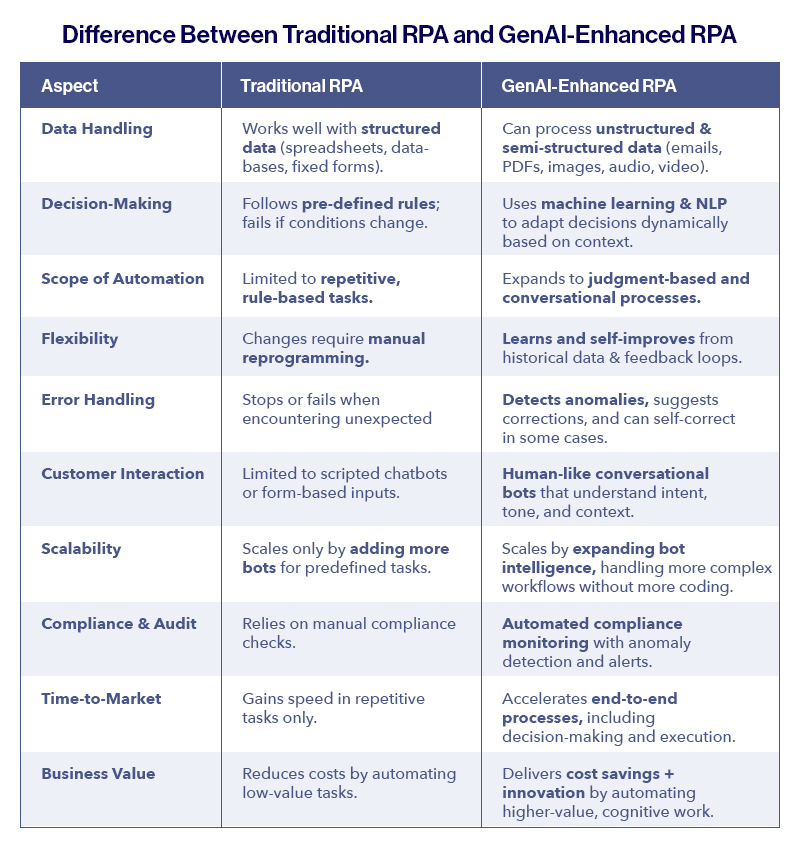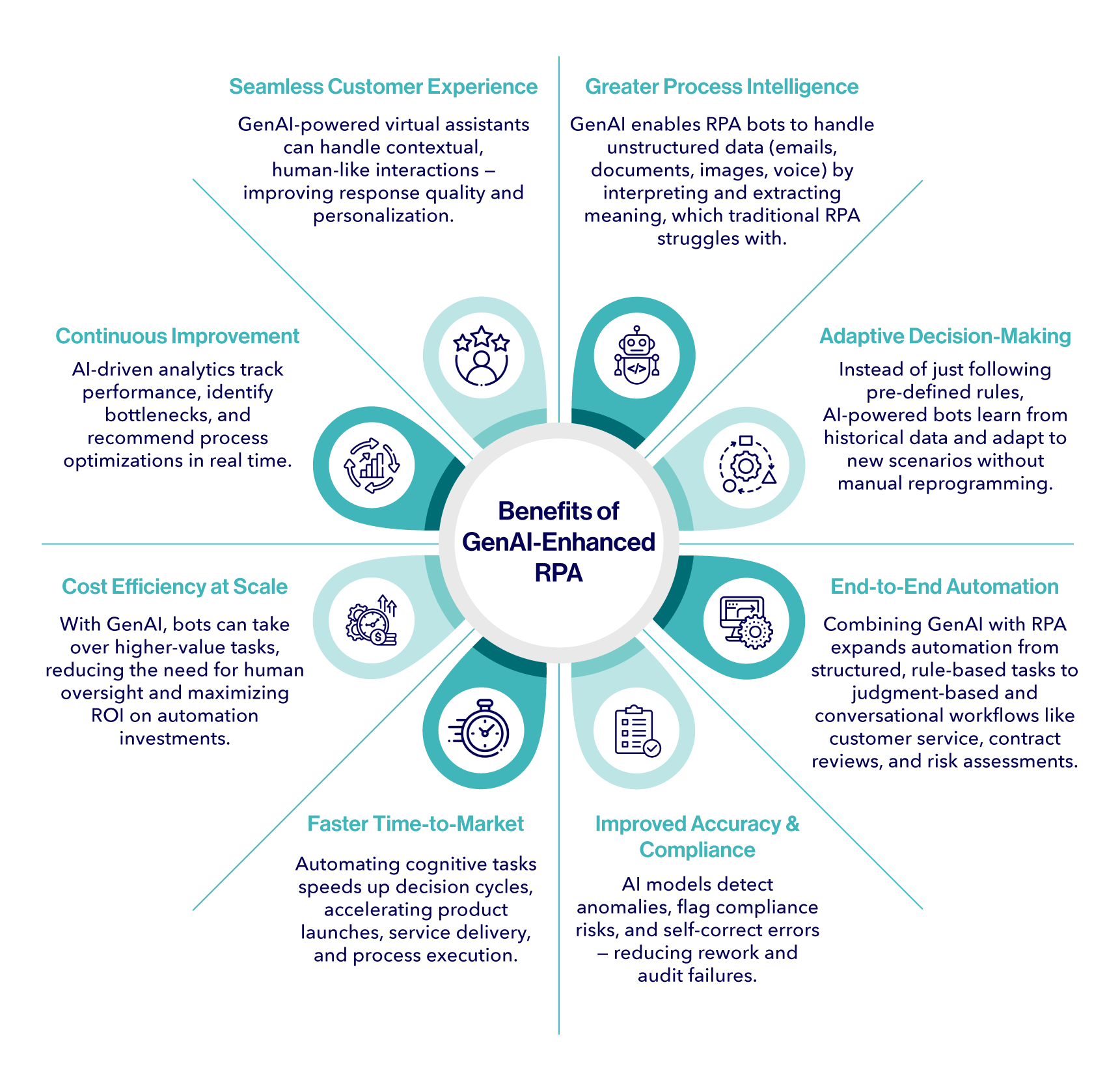Introduction
According to a report by PWC, Generative AI (GenAI) market growth will be contributing $15.7 trillion to the global economy by 2030, fundamentally transforming how businesses approach AI-driven automation. This staggering figure represents more than just economic potential—it signals a paradigm shift in how organizations can streamline operations, enhance decision-making, and unlock new levels of productivity.
For years, Robotic Process Automation (RPA) has served as the backbone of digital transformation in enterprises, automating repetitive tasks like automated data entry, invoice processing automation, and basic customer inquiries. Traditional RPA systems have delivered measurable gains by reducing manual workloads and improving accuracy across business processes. However, their rule-based automation nature limits flexibility in handling complex, unstructured tasks.
GenAI automation is now redefining these boundaries, transforming RPA into an intelligent automation force capable of orchestrating end-to-end workflows with context and creativity.
By integrating GenAI-powered RPA solutions with existing RPA infrastructure, organizations can create automation systems that not only execute predefined tasks but also understand context, make informed decisions, and continuously learn from new data patterns.
This shift represents a fundamental transformation from reactive automation to proactive AI-powered intelligence. Where traditional RPA required explicit programming for each scenario, GenAI-enhanced intelligent process automation can analyze situations, generate appropriate responses, and adapt their behavior based on changing business requirements. The result is a new generation of automation that combines the reliability of RPA with the cognitive capabilities of advanced AI.
Understanding GenAI and RPA Synergy
GenAI technology refers to artificial intelligence systems capable of creating new content, insights, and solutions by learning from vast datasets. Unlike traditional AI that simply classifies or predicts, GenAI in enterprise automation can generate text, images, code, and even complex decision trees that didn't previously exist. This creative capability extends far beyond content generation—it enables systems to develop novel approaches to problem-solving and process optimization.
Robotic Process Automation software encompasses technologies that automate repetitive, rule-based tasks typically performed by humans. RPA bots can navigate applications, manipulate data, trigger responses, and communicate with other systems, all while following predetermined workflows. Traditional RPA excels at high-volume, routine processes but struggles with exceptions, unstructured data, and scenarios requiring human-like judgment.
The intersection of GenAI and Intelligent Process Automation creates what industry experts call AI-augmented RPA solutions. This combination leverages RPA's proven execution capabilities while adding GenAI's contextual understanding and adaptive learning. The result is automation that can handle complex, variable workflows while maintaining the speed and consistency that makes RPA valuable.
Fun fact: The global robotic process automation market size was valued at $22.79 billion in 2024 and is expected to reach $178.55 billion by 2033, growing at a remarkable CAGR of 25.7%. The integration of GenAI in RPA platforms is a primary factor driving this growth.
Consider how a traditional RPA bot in finance automation processes invoices: it extracts data from specific fields, validates against predetermined rules, and routes for approval based on fixed criteria. A GenAI-enhanced automation system can analyze invoice content contextually, identify anomalies that don't fit standard patterns, generate appropriate responses to vendor inquiries, and even predict future processing bottlenecks based on historical patterns.
How GenAI Transforms Traditional RPA Capabilities
Intelligent Decision-Making
GenAI in business automation empowers RPA systems to move beyond binary, rule-based decisions to nuanced, context-aware choices. Traditional RPA bots follow if-then logic trees, but GenAI-powered RPA solutions can weigh multiple variables, consider historical outcomes, and generate optimal decisions for complex scenarios.
This transformation is particularly powerful in customer service automation workflows. While traditional RPA might route support tickets based on simple keywords, GenAI in customer service automation can analyze customer sentiment, review interaction history, assess urgency levels, and predict resolution complexity. The system can then prioritize tickets intelligently, suggest appropriate responses, and even escalate cases before they become critical issues.
Financial institutes showcase the best example of intelligent decision-making. They are leveraging GenAI for fraud detection as it helps analyse transaction patterns, customer behavior, and external risk factors to identify potential fraud with greater accuracy than rule-based systems. The technology can adapt to new fraud patterns without requiring manual rule updates, staying ahead of evolving threats.
Advanced Natural Language Processing (NLP)
Natural Language Processing in RPA powered by GenAI enables automation systems to understand and process unstructured data sources like emails, documents, chat conversations, and social media content. This breakthrough eliminates one of traditional RPA's biggest limitations—the inability to handle variable, text-based information.
For example, AI in legal automation is being used by law firms to analyze contracts, identify key clauses, extract relevant information, and flag potential issues.
As many as 70% of law firms have integrated AI-powered legal process automation into their workflows, demonstrating a substantial shift toward automation in legal services. This includes tasks like document management, contract analysis, and case management, where RPA automates repetitive rule-based tasks, and GenAI legal tools add advanced comprehension and contextual understanding.
Dynamic Customization and Scalability
GenAI scalability in RPA enables systems to customize their behavior based on specific business contexts and requirements. Rather than deploying one-size-fits-all automation, organizations can create adaptive systems that modify their approach based on various factors like customer segments, product types, or market conditions.
Manufacturing companies are using this capability for AI-driven supply chain optimization. GenAI-enhanced RPA systems analyze demand patterns, supplier performance, inventory levels, and market conditions to generate customized procurement strategies. The system can adapt to seasonal variations, respond to supply disruptions, and optimize ordering schedules for different product lines simultaneously.
HR process automation also benefits from customized automation in talent acquisition. GenAI can analyze job requirements, candidate profiles, and hiring history to customize screening criteria for different roles. The system generates tailored interview questions, creates role-specific assessment criteria, and adapts communication strategies based on candidate preferences and backgrounds.
Industry Applications Driving Transformation
Customer Service Revolution
Customer service is experiencing a significant transformation with the integration of GenAI in customer experience automation and Robotic Process Automation for customer service. Intelligent systems are now capable of delivering personalized, empathetic, and context-aware support at scale, far beyond basic query handling.
In the telecommunications sector, companies are using GenAI-powered virtual agents to resolve technical issues, process service changes, and manage billing inquiries. These systems can generate step-by-step troubleshooting guides tailored to each customer's setup, analyze service usage to recommend better plans, and identify potential issues before they affect the user experience. When needed, complex cases are smoothly escalated to human agents for resolution.
Retail organizations are enhancing AI-powered customer engagement by deploying systems that handle personalized product recommendations, order modifications, and real-time support. The AI understands customer preferences, evaluates purchase history, and delivers suggestions that increase both satisfaction and revenue.
This shift toward AI-driven customer service automation is not only increasing efficiency but also redefining the standards of exceptional customer service.
Finance and Accounting Transformation
Financial services are being revolutionized by the integration of GenAI in financial process automation and AI-powered RPA in banking. Organizations are achieving new levels of accuracy, speed, and regulatory compliance. These advanced systems can process complex financial documents, generate detailed regulatory reports, and detect compliance risks with a level of precision that far exceeds traditional methods.
Investment firms are transforming their research functions by using AI-driven investment analysis tools to produce market analysis reports that synthesize data from diverse sources. These systems can uncover emerging trends, link market events to performance outcomes, and deliver investment insights that would typically require large teams of analysts.
Banking institutions are streamlining AI-powered credit risk assessment through automation. The technology reviews loan applications, evaluates financial statements, and produces real-time risk assessments. It also adapts to evolving market conditions and regulatory frameworks, ensuring consistent and transparent decision-making.
Healthcare Innovation
Healthcare organizations are harnessing the power of GenAI in healthcare automation combined with RPA to elevate patient care while significantly reducing administrative workloads. These intelligent systems can process electronic medical records, generate accurate treatment summaries, and detect potential care gaps with exceptional precision.
Hospital systems are automating AI-powered insurance authorization workflows by analyzing treatment plans against policy guidelines and generating required documentation. The technology can flag cases that may need further review, prepare appeal documentation for denied claims, and monitor authorization status for multiple patients in real time.
Medical billing departments are streamlining operations through AI-driven medical billing automation that understands complex coding standards, identifies errors before submission, and generates appeals for rejections. The system continuously learns from past outcomes to improve accuracy and adapt to shifting regulatory requirements.
By integrating healthcare RPA with Generative AI, organizations are not only improving operational efficiency but also enhancing the quality and continuity of care for every patient.
Supply Chain Optimization
Supply chain management is rapidly evolving through the adoption of GenAI supply chain automation, delivering faster, smarter, and more resilient operations. These advanced systems analyze vast logistics data, anticipate demand shifts, and make real-time routing and fulfillment decisions that drive efficiency and agility.
Global manufacturers are using AI-powered procurement automation to streamline supplier collaboration by automatically generating purchase orders based on live demand forecasts and inventory status. The system adjusts dynamically to supplier constraints, identifies alternative sourcing opportunities, and negotiates delivery timelines that enhance overall supply chain performance.
Retail enterprises leverage AI-driven inventory management systems to fine-tune stock distribution across locations. By analyzing sales patterns, seasonal trends, and regional market behaviors, the AI recommends stocking strategies that reduce waste and improve availability. It can detect upcoming demand surges, flag underperforming products, and suggest pricing or markdown strategies to improve turnover and profitability.
With GenAI in supply chain optimization, organizations are moving from reactive management to proactive optimization, unlocking new levels of speed, accuracy, and competitive advantage.

Benefits of GenAI-Enhanced RPA
Enhanced Business Efficiency
The combination of GenAI and intelligent process automation creates efficiency improvements that go far beyond traditional automation. These systems can handle complex, multi-step processes that previously required human intervention, while adapting to variations and exceptions that would stop traditional bots.
Organizations report processing time reductions of 60-80% for complex workflows like AI-powered contract analysis, regulatory compliance reporting automation, and customer onboarding automation. More importantly, these improvements come with increased accuracy and consistency, as GenAI systems can identify patterns and potential errors that human reviewers might miss.
Significant Cost Reduction
While initial implementation costs may be higher than traditional RPA, GenAI in business process automation delivers superior ROI through broader application scope and reduced maintenance requirements. These systems can handle process variations without custom programming, reducing the ongoing development costs that often plague traditional automation projects.
Organizations also achieve significant cost savings by optimizing how resources are allocated. As automation takes over routine tasks such as AI-powered data analysis and processing, employees are free to focus on more strategic and creative work. This not only boosts productivity but also enhances job satisfaction and retention, ultimately lowering the costs associated with hiring and training new staff.
Enhanced Customer Experience
AI-powered customer experience automation enables organizations to deliver personalized, responsive customer interactions at scale. These systems can understand individual customer needs, preferences, and communication styles, generating interactions that feel genuinely helpful.
Moreover, with GenAI customer service tools, response times improve dramatically as systems can handle complex inquiries immediately rather than routing them for human review. Customers receive more accurate, comprehensive responses, and issues are often resolved in a single interaction rather than requiring multiple exchanges.
Scalable Innovation
GenAI RPA solutions enable continuous improvement and innovation across the organization. These intelligent systems learn from every interaction, uncovering new opportunities to optimize processes and expand automation.
Unlike traditional RPA, GenAI automation platforms require minimal custom programming, allowing organizations to scale automation quickly across different departments and workflows. This flexibility empowers businesses to adapt rapidly to market shifts, regulatory changes, and evolving competitive demands.

Overcoming Implementation Challenges
Navigating Integration Complexity
Implementing Generative AI-powered RPA solutions is not just a plug-and-play exercise—it demands strategic planning and technical expertise. Successful deployment depends on aligning enterprise automation data systems, ensuring robust AI security in automation, and managing organizational change. The most effective approach is to work with intelligent automation consultants and expand gradually.
Organizations often start with RPA and AI pilot projects to demonstrate value, build team expertise, and fine-tune implementation strategies. This phased, iterative method helps reduce risk while fostering confidence and buy-in across the business.
Addressing Ethical Concerns and Workforce Impact
As GenAI-powered intelligent process automation becomes more capable, it raises critical questions around AI ethics in automation, job displacement, decision transparency, and responsible AI use. Organizations must take a proactive approach to address these concerns.
Industry leaders must invest in comprehensive AI reskilling and upskilling programs to help employees transition into higher-value, strategic roles. At the same time, AI governance frameworks are being put in place to ensure that GenAI decision-making systems make fair, unbiased, and accountable decisions.
Transparency is essential, especially when AI automation systems influence outcomes that affect customers, employees, or partners. Organizations must ensure these systems can explain their decisions and provide clear audit trails to meet both ethical standards and regulatory requirements.
The Future of Intelligent Automation
Toward Self-Healing and Adaptive Systems
The next wave of AI-powered business process automation will feature self-healing automation systems that detect and fix issues without human intervention. These systems will monitor their own performance, identify potential breakdowns, and take corrective action, reducing downtime and improving reliability.
Through adaptive AI learning, automation will evolve continuously, refining its performance based on new data, business inputs, and changing environments.
The Rise of Autonomous Enterprise Operations
Looking ahead, organizations are shifting toward a future where GenAI in enterprise operations drives fully autonomous business processes. These systems will coordinate cross-functional workflows, perform advanced AI-driven data analytics, and make operational decisions in real time.
As this transformation unfolds, the role of human talent will shift to focus on strategy, innovation, and relationship-building, while intelligent systems take over execution, monitoring, and optimization. This marks the beginning of a new era where human-AI collaboration in business automation powers sustainable growth.
Embracing the Intelligent Automation Revolution
The future belongs to organizations that learn to blend human creativity with AI intelligence. Generative AI-enhanced RPA solutions provide the platform for this integration, enabling businesses to achieve levels of efficiency, innovation, and customer satisfaction that seemed impossible just years ago.
Are you ready to revolutionize your automation strategy? Explore how Relevance Lab intelligent automation services can help you integrate GenAI in business workflows and unlock the full potential of enterprise AI automation for your organization.

